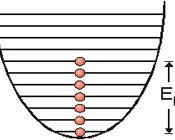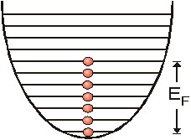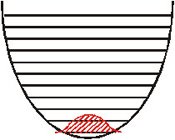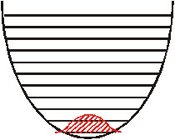Fermions & Bosons




What distiguishes "Ultra-cold atoms" from room-temperature atoms is that they are in (or near) the quantum degenerate regime. This regime is acheived when the thermal de Broglie wavelength of the atoms is comparable to the interparticle spacing -- ie, when one atom can "feel" that its neighbor is a quantum mechanical object. What happens when a gas is cooled further into the degenerate regime depends on what type of particle is being cooled.
Fermions are particles which obey the Pauli Exclusion Principle, which states that this type of (identical) particle must be in a state that is antisymmetric with respect to particle exchange. In other words, no two particles may occupy the same state. When Fermions get cold, they try to go to the lowest energy levels of a system but "stack up" in the way depicted at left above.
This should be contrasted with the behavior of Bosons, which condense to the lowest state at cold temperatures, as depicted above on the right. The accumulation of atoms in the ground state is called a Bose-Einstein condensate (BEC). The Nobel prize of 2001 was given for the first observations of and experiments with a BEC in a dilute gas.
It turns out that all integer-spin particles (such as photons, mesons, and neutral atoms with an even number of neutrons) are bosons, and all half-integer spin particles (such as electrons, protons, neutrons, and all neutral atoms with an odd number of neutrons) are fermions. The relationship between spin and statistics is profound and difficult to explain simply; one finds that a self-consistant quantum field theory cannot be constructed in any other way.
Fermi statistics are responsible for many phenomena we see in nature: the structure of the periodic table, the stability of matter and of neutron stars, and the conduction bands in solids. Bose statistics explain lasers (since photons are bosons), superfluidity, and superconductivity.
For more information about Bose and Fermi statistics, follow the links below.
Links and Articles:
- Nobel press release: about Bose-Einstein Condensates and the 2001 Laureates
- Physics 2000 interactive web site at UC Boulder
- Experimental BEC review article by Ketterle et al: arXiv/cond-mat/9904034
- Theoretical BEC review article by Dalfovo et al: arXiv/cond-mat/9806038
DOI: 10.1103/RevModPhys.71.463 - Experimental review of ultracold Fermi gases by Ketterle and Zwierlein: arXiv:0801.2500
DOI:10.1393/ncr/i2008-10033-1 - Ultracold Bose and Fermi Quantum Gases, Fetter, Levin, & Stamper-Kurn, eds. (Elsevier, 2012)
Chapter 1: D. M. Stamper-Kurn and J. H. Thywissen
Experimental Methods of Ultracold Atomic Physics
[chapter: arXiv:1111.6196][book on Amazon] ISBN-13: 978-0444538574; ISBN: 0444538577
- History of superfluidity by Griffin: arXiv:cond-mat/9901123
